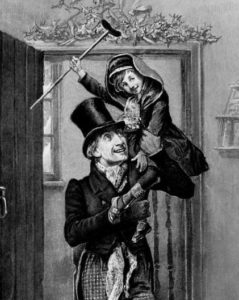
Editor’s Note: In the spirit of the 2023 holiday season, we’ve chosen to reprint one of our most popular articles by frequent blogger, Ben Mattlin. Ben draws insights from the classic story, “A Christmas Carol,” where he addresses the potential harm of disability porn, while guiding readers instead in identifying authentic disabled role models. It’s a thoughtful exploration that aligns with the essence of the season.
Growing up as a Jewish kid in New York City, I loved watching all the holiday kids’ specials on TV. From them I learned that Christmas is all about Santa Claus and presents and family and magic. There were so many versions of Dickens’ A Christmas Carol that I soon memorized all the best lines. “You were always a good man of business, Jacob…” “Mankind was my business.” “I wear the chain I forged in life. I made it link by link and yard by yard.” And of course, “God bless us, every one.”
That last—in case you’ve been living under a rock for the past century—is from Tiny Tim, the disabled son of Scrooge’s overworked and underpaid clerk, Bob Cratchit. We are led to believe (spoiler alert) that if Scrooge pays his employee better, Tiny Tim has a chance of surviving and maybe even of being cured.
I recall laughing at Tiny Tim’s pathos. It made me uncomfortable. As a lifelong wheelchair user, I supposed many people thought of me as a kind of Tiny Tim—the cute, sad, plucky little kid you root for!
Tiny Tim is a kind of archetype in disability culture: He is a quintessential example of inspiration porn. If you don’t know what that means, watch this TED Talk by the late comedian and journalist Stella Young, a wheelchair user with dwarfism. “We have been lied to about disability,” she says. “We’ve been sold the lie that disability is a bad thing … and to live with disability makes you exceptional.” Portraying disabled people as heroic for living ordinary lives is like pornography, she goes on, in that it objectifies one group of people for the benefit of another group. It effectively communicates that disabled people exist—or are only worth photographing or writing about—to inspire or motivate nondisabled people and get them to think, However bad my life is, it could be worse. I could be that person. “But what if you are that person?” she asks.
Looking For Disabled Role Models
Of course, disabled people have many other archetypes and role models to look to, fortunately. For a certain generation, it might be President Franklin Delano Roosevelt. He was a polio survivor who really couldn’t walk unassisted but did his best to hide it, to portray grace under pressure. He embodied the overachiever model, the “good patient” who fights the invading disability with pluck and valor. Because of FDR, any parent of a disabled kid can honestly say, “You can be anything you want when you grow up—even president!” But it’s a complicated legacy. Minimizing or denying your limitations may seem like the only way to get ahead sometimes, but it’s hardly disability pride.
Others might look to Roger Demosthenes O’Kelly. Born in 1880, in Raleigh, North Carolina, he caught scarlet fever at age 9, which left him Deaf and partially blind. When Gallaudet University, the private educational institution for Deaf students, refused to accept him because he was Black, he went on to earn a law degree from Yale University. He became the nation’s first Deaf and Black lawyer, practicing in Raleigh for decades before his death in 1962 at age 82.
Similar but different is the example of Helen Keller. She was born the same year as O’Kelly, 1880, in Tuscumbia, Alabama, but in completely different circumstances. At 19 months old, Keller came down with a severe illness—like O’Kelly—that left her permanently Deafblind. But Keller’s family was white, well-to-do, and well-connected. She attended Radcliffe College, where her tuition was paid entirely by a benefactor, Standard Oil head Henry Huttleston Rogers. More than a half-century after her death in 1968, she remains a role model for many. But her legacy is complicated. For some people, she represents a kind of inspiration porn. In the 1962 movie The Miracle Worker, she’s depicted as a “wild child … civilized by [her friend] Anne Sullivan,” writes Kathi Wolfe, a blind journalist. “For decades, I’ve chafed against Keller.” But more and more, people are remembering her for her progressive political causes—her writing and speeches as a champion of braille, disability rights, women’s rights, labor rights, and world peace. “I came to identify with her and respect her legacy,” writes Wolfe.
If disabled people are looking for role models, they have many to choose from—real life ancestors and fictional icons. Disability studies scholars keep unearthing more unsung disabled folks who’ve contributed to our culture. It turns out that we’ve always participated in society, even if sometimes our stories have been misunderstood or erased from the mainstream narrative.
The more we recognize these figures, recognize where we’ve come from, the easier it’ll be to develop a strong sense of who we are and where we’re heading. That’s a gift Santa’s elves would envy.

Ben Mattlin is a Los Angeles-based freelance writer, author and frequent blogger for FacingDisability.com. He was born with spinal muscular atrophy, a congenital muscle weakness that causes paralysis and related health issues.
Ben is the author of MIRACLE BOY GROWS UP: How the Disability Rights Revolution Saved My Sanity, and IN SICKNESS AND IN HEALTH: Love, Disability, and a Quest to Understand the Perils and Pleasures of Interabled Romance . He is a frequent contributor to the Washington Post, New York Times and Financial Advisor magazine. His work has also appeared in the Los Angeles Times, Chicago Tribune, and USA Today, and has been broadcast on NPR’s Morning Edition.
Is it possible to add me to your mailing list? I’d sincerely appreciate it.
Bob Hill
Your point that we are all only temporarily “abled” has stuck with me through the years. And with the Baby Boom aging, the number of people whose “abledness” is expiring will skyrocket. I foresee lots of “inspiration porn” aimed at this demographic. Maybe you can at least cash in on this inevitable annoying development with a screenplay. Maybe a new “Christmas Carol” with Tiny Tim as a grandfather figure… happy holidays!